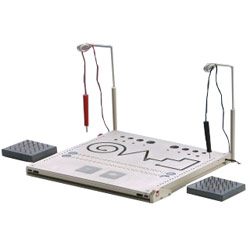Motor Performance Series - MLS - 1 Year License
Model 64051
Measurement of fine motor abilities through static and dynamic tasks for finger, hand and arm movement, to be used from seven years of age onwards.
Test Overview
Comprehensive fine motor abilities test battery with special norms for Morbus Parkinson patients.
Main Areas of Application
- Neuro-psychology
- Clinical psychology (also rehabilitation)
- Motor abilities diagnostics
- Industrial and organizational psychology
- Performance-oriented aptitude diagnostics
- Sport psychology, medicine, and pharmacology.
Theoretical Background
The Motor Performance Series (MLS) is a test battery developed by Schoppe based on Fleishman's factor-analytic examinations of fine motor abilities. The following six factors of fine motor abilities are analyzed by the MLS:
- Aiming (aiming of motion)
- Hand unrest, tremor
- Precision of arm-hand movements
- Manual dexterity and finger dexterity
- Rate of arm and hand movements
- Wrist-finger speed
Administration
The MLS Work Panel is required for the administration of the MLS. The dimensions of this Work Panel are 300 x 300 x 15mm and it is covered with boreholes, grooves and contact surfaces. A pen is attached to each edge (left and right) of the Work Panel. The right pen is black, the left one red. The following tasks have to be carried out on the Work Panel: Steadiness (one or both hands) Line tracking (one hand) Aiming (one or both hands) Inserting pins (one or both hands) Tapping (one or both hands).
Test Forms
The following test forms are available:
- S1: Standard form according to Schoppe & Hamster (17 subtests)
- S2: Short form according to Sturm & Bussing (8 subtests)
- S3: Short form according to Vassella (10 subtests)
It is possible to select individual test forms for test presentation.
Scoring
Result table: speed and / or accuracy measurements are calculated for the right and left hand for one-handed and two-handed administrations. Result table for fine motor abilities factors: table with mathematically estimated Fleishman factors of the right hand.
Profile: the standardized variables and the Fleishman factors can be displayed in a profile.
Reliability
Retest coefficients for the subtest-parameters Aiming, Line tracking and Tapping were calculated (test-retest interval 1 day). They varied between r=.52 and r=.92 for the right and r=.60 to r=.90 for the left and. For the subtest Tapping (variable "Hits") the consistency coefficient (Cronbach's Alpha) was calculated and amounted to r=.94.
Validity
Factor-analytic control examinations on clinical groups and one group of healthy persons led to the result that the six factors of the MLS clarify over 85% of the overall variance.
Comparisons between people with or without disturbances of the central motor system showed significant and highly significant differences in performance. This confirms that impairments in fine motor function can be objectified using the MLS. Only low correlations up to .35 were found between the variables of the MLS and cognitive requirements, as expressed e.g. in HAWIE, CFT and the STROOP test, and to various personality dimensions (e.g. extroversion, neuroticism, rigidity).
Norms
Test form S1: sample of school students between 13 and 19 years of age (N=300); university students between 18 and 26 years of age (N=100); sample adults (N=420), representative norm sample (N=107) collected at the research laboroatory of the Schuhfried Company in 2004. Test form S2: sample of patients without neurological symptoms (N=200), 2 samples of patients with Morbus Parkinson (N=70 and N=114); sample of IEFP clients – Portuguese. They are the N=320 clients of the company IEFP, tested in the years 1999 and 2000. Sample of traffic psychological clientele – Portuguese. They are N=1904 Portuguese respondents in traffic psychological studies.
Test form S3: right-handed children and adolescents (Vassella in Bern, N=352), right-handed children and adolescents (Hiebsch - Martin Luther University, Halle (Germany), N=92); left-handed children and adolescents (Hiebsch - Martin Luther University, Halle, N=29).
Testing Time
About 15 to 20 minutes (for the short form).
VTS System Overview
The Schuhfried VTS enables computer-assisted application of a large number of highly diverse psycho-diagnostic tests and measuring procedures. In developing the system much emphasis was placed on transparent structure and largely uniform design. It is therefore simple to operate and easy to understand and does not require any special computer skills.
The VTS basic module is required for administration of any of the available tests.
The Schuhfried VTS supports the administration of both single tests and test batteries. Many of the single tests are available in different test versions. These test versions may differ, for example, in terms of test duration or difficulty or may be parallel forms. They are characterized by different parameters reflecting specific test requirements. They have been designed for administration to a specific population (e.g. psychiatric patients, children, etc.) or for special measuring purposes (e.g. repeated measurements). Test batteries are compiled from the available single tests and test versions.

